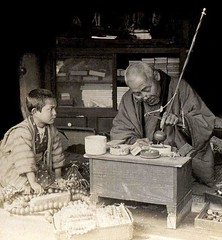Remember the ancient approach to Knowledge Management, of Master and Apprentice? Throughout the middle ages, and into the early industrial age, the Masters were the knowledge holders, and Apprenticeship was the system of transferring that knowledge to a new generation of practitioners of a skill. The Masters saw themselves not just as doers, but also as Teachers.
Has that ancient model survived to the knowledge age?Many clients we speak to are having real problems recruiting the knowledge holders to the concept of Knowledge Management. Even in those companies where knowledge holders are few, and knowledge seekers are many, the experienced subject matter experts are often reluctant to become involved with KM.
The reason is, that because knowledge is scarce, they are busy "doing the job", and have no time to teach or to share their knowledge. The fewer experienced practitioners the company has, the busier they are in actually performing the work.
Many experienced staff enjoy their expertise, and they see KM as a distraction or an added burden. They often feel that KM "is not my job".
"I am an experienced boiler-maker/salesman/brewer/application designer" they say; "my skills are in huge demand. Why should I take time out to share my knowledge? That's not my job"
Make KM "the job of the expert"
The answer to this, of course, is to make Knowledge Management (or at least a component of knowledge management) the expert's job.
You can't expect busy people, in demand from all over the organisation, to add to their burdens with work that isn't in their job description. But if their knowledge is vital to company performance, then acting as a steward of the knowledge of the organisation needs to be in their job description. It needs to be recognised as part of their job, and they need to be given the space, the resources, the assistance, and (if necessary) the training to allow them to share their knowledge with the next generation - the apprentice generation.
The old career progression was Apprentice - Journeyman - Master.
Knowledge Companies need to rediscover this progression, so that the Masters (of both sexes) - the Subject Matter Experts - can see their role as Teaching as well as Doing, and as passing on their skills to those who need them, through the tools of KM (wikis, community forums, peer assists etc) as well as through the traditional tools of apprenticeship (coaching, mentoring, training).
The New Role of the expert is two-fold - to be the Practice Owner for their domain of practice, and to play a coaching role in the relevant Community of Practice.
We need to rediscover this Mastership role, so we can fully reinstate the experts in their rightful place.





2 comments:
Hi Nick. Very valid points. Question, though.. We're struggling with measuring performance (metrics, KPIs, etc.) for the knowledge sharing efforts going on in our office. Like, truly, the knowledge has to be of value - not just counting how many wiki articles someone has created. Do you have any suggestions?
Hi Elle
Knowledge only has value when applied, so you need to measure the value of the knowledge application rather than the volume of information captured. The question is - how much better do people perform, when they have access to the knowledge they need?
You can find a range of posts dealing with the Valuation issue here
http://www.nickmilton.com/search/label/value
or email me and we can have a chat.
nick. milton @ knoco. com (remove the gaps for a valid email address)
Post a Comment